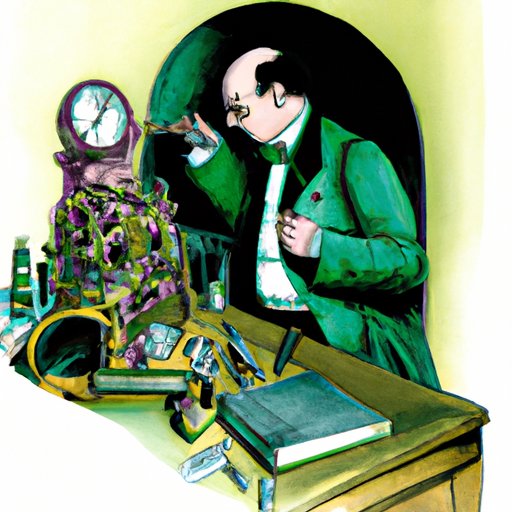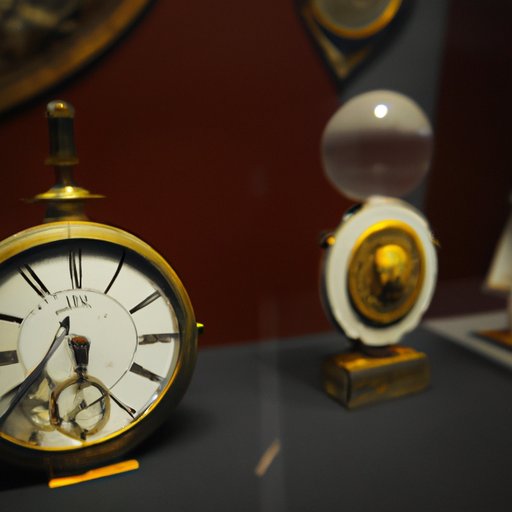Introduction
Clocks have been used for centuries to measure the passage of time. But who exactly invented the first clock? This article will explore the history of clocks and the inventor of the first one.
What is a Clock?
A clock is an instrument used to measure and indicate time. Clocks typically provide a variety of functions such as displaying the current time, tracking elapsed time, and providing alarms. Clocks come in all shapes and sizes, from wristwatches to grandfather clocks.
Why is the Invention of Clocks Important?
The invention of the clock has had a huge impact on human civilization. It allowed people to measure time more accurately, which enabled them to plan their activities with greater precision. This has led to a number of modern conveniences such as regular meal times, school schedules, and even shift work. The invention of the clock also revolutionized trade and navigation, making it easier for ships to calculate their position and stay on course.
A History of Clocks – Who Invented the First Clock?
To understand who invented the first clock, it’s important to look at the history of time telling and how it evolved over the centuries.
Ancient Uses of Time Telling
Before the invention of the mechanical clock, people relied on various methods to keep track of time. These included sundials, water clocks, and candle clocks.
Early Sundials
The earliest known form of time telling was the sundial. Sundials were used as early as 3500 BC in Egypt. They were simple devices that used the position of the sun to mark the passage of time.
Water Clocks
Water clocks, or clepsydras, were developed in Ancient Greece around 500 BC. These were vessels filled with water that slowly drained out, marking the passage of time.
Candle Clocks
Candle clocks were invented by the Chinese in the 8th century AD. These were candles with marks on them that burned down at a predictable rate, allowing people to measure time.
The Origins of the Mechanical Clock
The first mechanical clocks appeared in Europe in the 13th century. These clocks were powered by weights and operated using a system of gears and an escapement mechanism.
The Invention of the Verge Escapement
The verge escapement was a crucial component of the mechanical clock. It was invented by the English monk Richard of Wallingford in the 14th century. The verge escapement allowed the clock to keep accurate time by regulating the release of energy from the weights.
Development of the Spring-Driven Clock
In the 15th century, the German clockmaker Peter Henlein developed the first spring-driven clock. This clock used a coiled spring to power the clock rather than weights. This made the clock more portable and accurate.
Exploring the Inventor of the Clock
So who was the first to create a clock? Let’s take a closer look at the inventor of the clock and the technology that made it possible.
Who Was the First to Create a Clock?
The first mechanical clocks were invented in Europe in the 13th century. However, the first spring-driven clock was invented by the German clockmaker Peter Henlein in the 15th century. Henlein is often credited as the inventor of the clock.
Peter Henlein
Peter Henlein was born in Nuremberg, Germany in 1485. He was an accomplished craftsman and inventor, and is best known for his invention of the spring-driven clock. Henlein was the first to use a coiled spring as a power source for a clock, which allowed for more accurate timekeeping and portability. He is credited with popularizing the pocket watch, which he designed in 1505.
Other Notable Clockmakers
Henlein was not the only notable clockmaker of the era. Other inventors such as Galileo Galilei and Christiaan Huygens made significant contributions to the development of clocks. Galileo invented the pendulum clock in 1641, while Huygens invented the balance wheel escapement in 1675. Both of these inventions improved the accuracy of clocks and enabled them to keep time more precisely.
What Inspired the Invention of the Clock?
The invention of the clock was driven by a number of factors, including the need for more accurate timekeeping and technological advances.
The Need for Accurate Timekeeping
Accurate timekeeping was essential for keeping track of the hours of the day, especially for religious observances. Before the invention of clocks, people relied on sundials and other primitive methods of time telling. But these were not very accurate and could be affected by weather conditions. The invention of the clock allowed people to measure time more precisely, which was necessary for activities such as farming and trade.
Technological Advances
The invention of the clock was also made possible by advances in technology. The invention of the verge escapement by Richard of Wallingford allowed for more accurate timekeeping, while the development of the spring-driven clock by Peter Henlein made clocks more reliable and portable.

Taking a Look at the Inventor of the Clock
Now let’s take a closer look at the life and legacy of Peter Henlein, the inventor of the clock.
Peter Henlein’s Life and Legacy
Peter Henlein was born in Nuremberg, Germany in 1485. He was an accomplished craftsman and inventor, and is best known for his invention of the spring-driven clock. His invention revolutionized timekeeping and allowed people to measure time more accurately. He is also credited with popularizing the pocket watch, which he designed in 1505. Henlein died in 1542 and is remembered as one of the most influential clockmakers of all time.
Other Notable Clockmakers
Henlein was not the only notable clockmaker of the era. Other inventors such as Galileo Galilei and Christiaan Huygens made significant contributions to the development of clocks. Galileo invented the pendulum clock in 1641, while Huygens invented the balance wheel escapement in 1675. Both of these inventions improved the accuracy of clocks and enabled them to keep time more precisely.

How Time Telling Changed History – The Inventor of the Clock
The invention of the clock had a huge impact on human civilization. It revolutionized society, enabling people to plan their activities with greater precision. It also changed the way people navigated, making it easier for ships to calculate their position and stay on course.
How Clocks Revolutionized Society
The invention of the clock allowed people to measure time more accurately, which had a huge impact on society. This enabled people to plan their activities with greater precision, leading to the development of regular meal times, school schedules, and even shift work.
Impact on Trade and Navigation
The invention of the clock also revolutionized trade and navigation. Accurate timekeeping allowed ships to calculate their position and stay on course. This was crucial for long voyages, as sailors needed to know their exact location in order to make sure they didn’t get lost.
Tracing the Development of Clocks Through History – Who Invented the First One?
Let’s take a look at how clocks have evolved over the centuries.
Early Clock Models
The first mechanical clocks appeared in Europe in the 13th century. These clocks were powered by weights and operated using a system of gears and an escapement mechanism. These clocks were not very accurate and were often affected by variations in temperature.
Improvements in Clock Technology
Over the centuries, clock technology improved significantly. The invention of the verge escapement by Richard of Wallingford allowed for more accurate timekeeping. The development of the spring-driven clock by Peter Henlein made clocks more reliable and portable. And finally, the invention of the pendulum clock by Galileo Galilei and the balance wheel escapement by Christiaan Huygens further improved the accuracy of clocks.
Conclusion
In conclusion, the invention of the clock had a huge impact on human civilization. It allowed people to measure time more accurately, which enabled them to plan their activities with greater precision. This led to a number of modern conveniences such as regular meal times, school schedules, and even shift work. The invention of the clock also revolutionized trade and navigation, making it easier for ships to calculate their position and stay on course. The first mechanical clocks were invented in Europe in the 13th century. However, the first spring-driven clock was invented by the German clockmaker Peter Henlein in the 15th century. Henlein is often credited as the inventor of the clock.
(Note: Is this article not meeting your expectations? Do you have knowledge or insights to share? Unlock new opportunities and expand your reach by joining our authors team. Click Registration to join us and share your expertise with our readers.)
